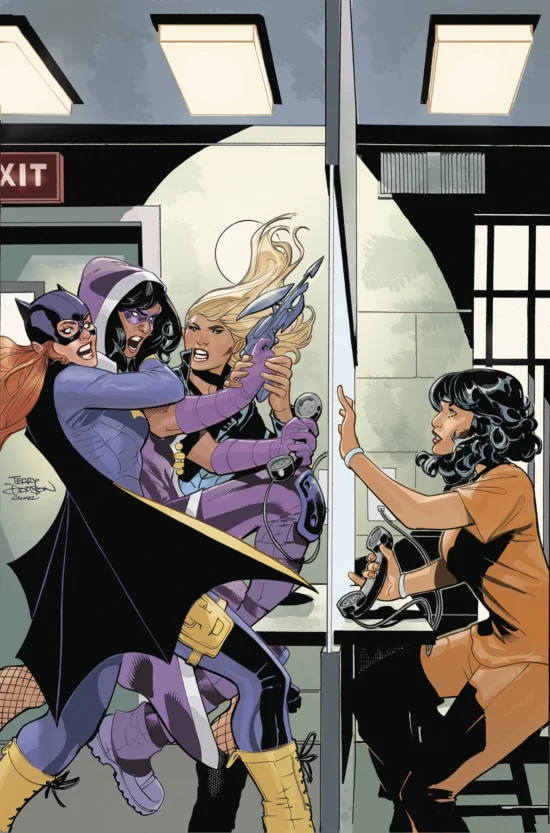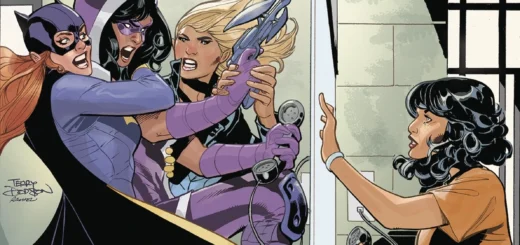The Law Is A Ass #462: I Parole My Eyes at the Huntress

Why was she there, in the first place?
Maria Bertinelli was convicted in Gotham City. So why was she in Blackgate Penitentiary? I thought all the criminals from Gotham City were sent to Arkham Asylum. Even the ones that clearly aren’t insane, such as The Penguin.
After her husband mob boss Frank Bertinelli was murdered, Maria Bertinelli took over his mob boss activities. Eventually Batgirl and the Birds of Prey caught Maria and, in Batgirl and the Birds of Prey #6, Bird of Prey member The Huntress turned Maria over to the police. Which probably made Huntress’s Christmas dinner with the family a little awkward, given that The Huntress was also Maria Bertinelli’s daughter, Helena.
Maria was convicted of “running a criminal enterprise” and sentenced to Blackgate Penitentiary for six years. Six years for a mob boss and reputed murderer? Fred Astaire was elephantine on his feet compared to this sentence. Now, after serving “a year and change” Maria’s up for parole. First a six-year sentence then parole eligibility after serving twenty percent of her sentence? Is the whole Gotham City penal system designed to give Batman job security?
Maria subpoenaed Helena to testify as a character witness in the parole hearing. That was something of a tricky proposition for Helena, considering that Maria, like an actress who wasn’t cast in the play, has no character.
But never let it be said that a heroine like Huntress passed up a civic obligation. After she got her subpoena, Helena went to the Gotham City Courthouse for her mother’s parole hearing.
Wait! Helena went where for the hearing?
Now, don’t get ahead of me. If you’re thinking Maria was convicted of felonies, so she wouldn’t be in city court, she’d be in a county court— good for you, you were paying attention to my old columns. But while you’re right that Maria’s parole hearing shouldn’t have been in the Gotham City Court, you’re right for the wrong reason. Maria’s parole hearing shouldn’t have been in Gotham City Court, because it shouldn’t have been in any court. You see in…
(Wait, Gotham City’s still in southern New Jersey, isn’t it? It didn’t move during Flashpoint or Rebirth or Crisis on Infinite Reboots did it?)
…in New Jersey, the court’s aren’t responsible for parole, the New Jersey State Parole Board is. Moreover, courts don’t hold hearings to determine whether an inmate should be granted a parole, the State Parole Board’s Division of Release does. Indeed, Division of Release’s web page says its, “primary duty… is to evaluate and assess each of New Jersey’s adult incarcerated inmates, and determine their eligibility and appropriateness for parole release.”
(Speaking of eligibility, under New Jersey law an inmate isn’t eligible for parole until the inmate has served one-third of his or her sentence. On a six-year sentence, one-third would be two years. So I was correct a “year and change” meant Maria was up for parole too early; unless “change” is slang for an entire year.)
The regulations for the Division of Release state that parole hearings are held before two members of the Parole Board, not before the judge who passed sentence. Maria’s hearing shouldn’t have been in Gotham City Court, it should have been in some parole hearing room in Blackgate. (See? Right for the wrong reason.)
Judge Watson denied Maria’s parole. No problem there. Maria didn’t seem repentant and wasn’t parole eligible anyway. I did have a problem with what the judge did next. He ruled that Maria be transferred to Arkham Asylum “to be treated for her criminal insanity.”
Judges can’t just do that, declare someone insane and order them into a civil commitment in an asylum. There has to be a hearing to determine the defendant’s mental status first.
This hearing would require expert witnesses to testify why they believed the defendant was mentally ill and needed to be committed. Judge Watson couldn’t commit Maria on his own motion and without any evidence by tacking it onto the end of a parole hearing. No judge would do something that blatantly wrong unless the judge was on the…
Oh, Judge Watson was on the take, wasn’t he? The super villain the Calculator needed to free Maria as part of his master plan and calculated it would be easier to break her out of Arkham than Blackgate. (Considering the frequency with which Arkham’s patients leave without leave, that wasn’t a bad calculation.) Calculator bribed Judge Watson to move Maria to Arkham, and by the end of the issue, Calculator had broken Maria out of Arkham.
So what Judge Watson did was wrong. No, not accepting the bribe. Well, yes, accepting the bribe was wrong, but Judge Watson’s bigger mistake was in moving Maria to Arkham in such a blatantly improper and illegal manner. When you’re on the take, you shouldn’t do what you were paid to do in a way that makes it obvious that you were paid to do it. It tends to lead to messy questions. And smart aleck columns.
This brings us back to my original question, why was Maria in Blackgate in the first place? If the story needed her to be in Arkham, why didn’t Judge Watson just do what every other judge in Gotham does, send her to Arkham with all the other criminals? Then Maria would already have been in Arkham and none of us would have had to read that whole silly parole hearing scene.
Unless… Hey, do you suppose Judge Watson was looking out for me, because he knew I’d been needing a column topic right about now?












